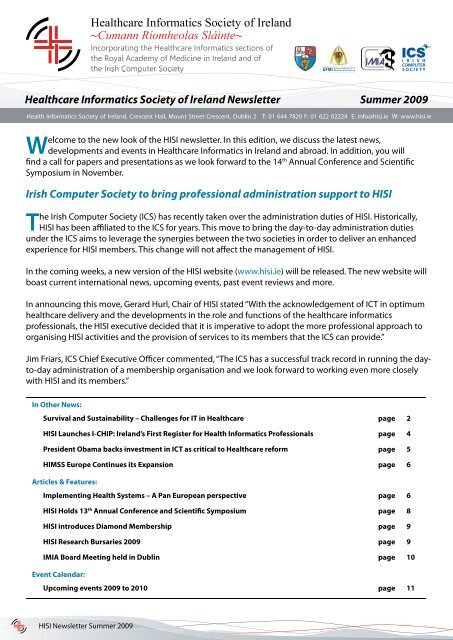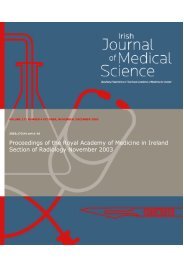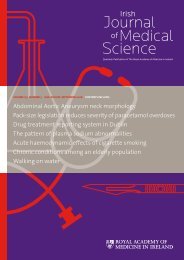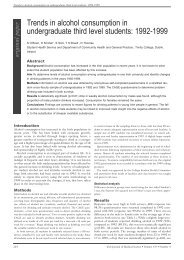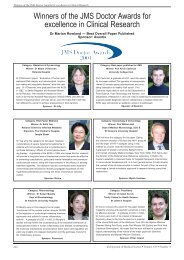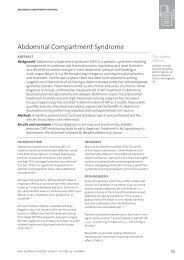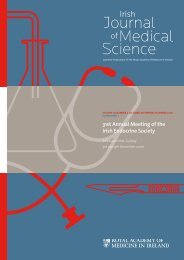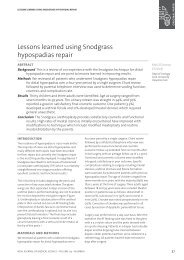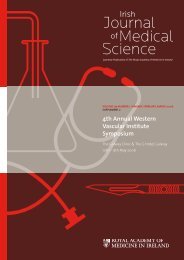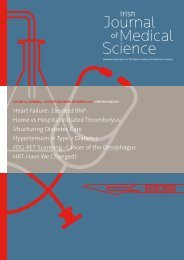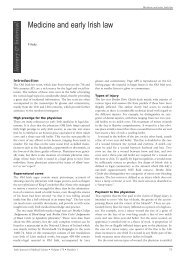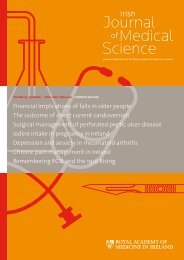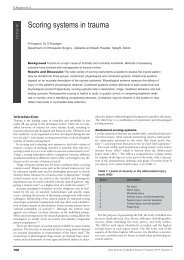HISI summer 2009 - IJMS | Irish Journal of Medical Sciences
HISI summer 2009 - IJMS | Irish Journal of Medical Sciences
HISI summer 2009 - IJMS | Irish Journal of Medical Sciences
Create successful ePaper yourself
Turn your PDF publications into a flip-book with our unique Google optimized e-Paper software.
Healthcare Informatics Society <strong>of</strong> Ireland Newsletter Summer <strong>2009</strong><br />
Health Informatics Society <strong>of</strong> Ireland, Crescent Hall, Mount Street Crescent, Dublin 2 T: 01 644 7820 F: 01 622 02224 E: info@hisi.ie W: www.hisi.ie<br />
Welcome to the new look <strong>of</strong> the <strong>HISI</strong> newsletter. In this edition, we discuss the latest news,<br />
developments and events in Healthcare Informatics in Ireland and abroad. In addition, you will<br />
find a call for papers and presentations as we look forward to the 14 th Annual Conference and Scientific<br />
Symposium in November.<br />
<strong>Irish</strong> Computer Society to bring pr<strong>of</strong>essional administration support to <strong>HISI</strong><br />
The <strong>Irish</strong> Computer Society (ICS) has recently taken over the administration duties <strong>of</strong> <strong>HISI</strong>. Historically,<br />
<strong>HISI</strong> has been affiliated to the ICS for years. This move to bring the day-to-day administration duties<br />
under the ICS aims to leverage the synergies between the two societies in order to deliver an enhanced<br />
experience for <strong>HISI</strong> members. This change will not affect the management <strong>of</strong> <strong>HISI</strong>.<br />
In the coming weeks, a new version <strong>of</strong> the <strong>HISI</strong> website (www.hisi.ie) will be released. The new website will<br />
boast current international news, upcoming events, past event reviews and more.<br />
In announcing this move, Gerard Hurl, Chair <strong>of</strong> <strong>HISI</strong> stated “With the acknowledgement <strong>of</strong> ICT in optimum<br />
healthcare delivery and the developments in the role and functions <strong>of</strong> the healthcare informatics<br />
pr<strong>of</strong>essionals, the <strong>HISI</strong> executive decided that it is imperative to adopt the more pr<strong>of</strong>essional approach to<br />
organising <strong>HISI</strong> activities and the provision <strong>of</strong> services to its members that the ICS can provide.”<br />
Jim Friars, ICS Chief Executive Officer commented, “The ICS has a successful track record in running the dayto-day<br />
administration <strong>of</strong> a membership organisation and we look forward to working even more closely<br />
with <strong>HISI</strong> and its members.”<br />
In Other News:<br />
Survival and Sustainability – Challenges for IT in Healthcare page 2<br />
<strong>HISI</strong> Launches I-CHIP: Ireland’s First Register for Health Informatics Pr<strong>of</strong>essionals page 4<br />
President Obama backs investment in ICT as critical to Healthcare reform page 5<br />
HIMSS Europe Continues its Expansion page 6<br />
Articles & Features:<br />
Implementing Health Systems – A Pan European perspective page 6<br />
<strong>HISI</strong> Holds 13 th Annual Conference and Scientific Symposium page 8<br />
<strong>HISI</strong> introduces Diamond Membership page 9<br />
<strong>HISI</strong> Research Bursaries <strong>2009</strong> page 9<br />
IMIA Board Meeting held in Dublin page 10<br />
Event Calendar:<br />
Upcoming events <strong>2009</strong> to 2010 page 11<br />
<strong>HISI</strong> Newsletter Summer <strong>2009</strong>
Survival and Sustainability – Challenges for IT in Healthcare<br />
Extract from address by Pr<strong>of</strong>. Gerard Lyons, <strong>HISI</strong> President at <strong>HISI</strong> Special One-Day conference<br />
in Dublin April 23rd <strong>2009</strong><br />
This special one-day <strong>HISI</strong> conference is being held to recognise the visit to Ireland <strong>of</strong> the<br />
Board <strong>of</strong> the International <strong>Medical</strong> Informatics Association (IMIA). We hope this event will provide<br />
an opportunity to learn from international experience and to gain a better understanding <strong>of</strong> the shared<br />
challenges and opportunities we face as healthcare IT specialists. In the 42 years since its foundation,<br />
IMIA has served to promote the advancement <strong>of</strong> healthcare through the application <strong>of</strong> informatics<br />
developments in clinical practice and healthcare management. It has recognised that we share many<br />
common challenges across the globe. Critically, it has fostered a mutual respect and understanding<br />
between clinicians and informatics pr<strong>of</strong>essionals, as the only sustainable platform upon which practical<br />
improvements can be made in healthcare IT.<br />
This conference is being held at a defining period for publicly<br />
funded healthcare systems throughout the world. Ireland Inc.<br />
represents a live and emerging case study which has parallels<br />
throughout the developed world. While the IMF has forecast<br />
a global economic contraction <strong>of</strong> about 1½% this year, most<br />
commentators now agree on a GNP decline <strong>of</strong> 8-10% in Ireland,<br />
followed by a further 3% negative growth in 2010. In Ireland,<br />
“current tax revenue<br />
simply cannot afford<br />
to sustain healthcare<br />
spending levels”<br />
current year expenditure on publicly funded health and social services now accounts for as much as 45%<br />
<strong>of</strong> the total national tax revenue. With effective increases in taxation biting hard (by up to 20%) into takehome<br />
salaries, coupled with a doubling <strong>of</strong> real unemployment in just a year, we must all now face-up to the<br />
underlying challenge <strong>of</strong> escalating costs <strong>of</strong> public healthcare systems and question the sustainability <strong>of</strong><br />
this form <strong>of</strong> provisioning in the medium term.<br />
However, in the short-term, we are faced with the more immediate challenge <strong>of</strong> survival, as current<br />
tax revenue simply cannot afford to sustain healthcare spending levels. In Ireland, this comes at a very<br />
unfortunate time as the programme <strong>of</strong> healthcare transformation, led by the Health Service Executive, may<br />
well be crippled by an inability to invest in the future. Should this happen, we will all be faced with a far<br />
worse taxation burden in the future and a much poorer healthcare service.<br />
If there is anything to be gained from the current global economic meltdown, it is the loud wake-up call<br />
to re-evaluate our current ingrained aspirations, assumptions and “ways <strong>of</strong> doing things around here”. The<br />
White House Chief <strong>of</strong> Staff, Rahm Emanuel, recently advised that “one should never waste a good crisis”. So,<br />
this period may well be defined by a new willingness to face-up to the stark realities <strong>of</strong> public healthcare<br />
and take a more mature and responsible attitude to promoting reform, whether as tax payers, healthcare<br />
providers, patients, carers, doctors, nurses or trade-union bodies.<br />
Some <strong>of</strong> our most pressing responsibilities are:<br />
• An ageing population which will drive further increases in demand for healthcare within the next 10<br />
years – this is an unstoppable trend!<br />
• Lifestyle choices (evidenced by increasing Body Mass Index and per capita alcohol consumption)<br />
which are already placing a huge burden on the healthcare system and this will rise exponentially<br />
unless we can tackle the problem at source – personal accountability!<br />
• Healthcare outcomes which are poorer in Ireland for many conditions despite the high spending<br />
levels – clearly, we have an urgent need to re-think delivery processes and structures, both on the<br />
clinical practice side and on the provisioning cost dimension!<br />
• Rising wealth which has promoted unrealistic aspirations for a uniformly high-quality healthcare,<br />
while appearing unwilling to bear increased taxation – someone’s got to pay!<br />
• A need to balance health promotion and disease prevention with the exponentially increasing costs<br />
<strong>of</strong> high-acuity treatments, as well as an evaluation <strong>of</strong> the efficacy <strong>of</strong> advanced health technologies.<br />
2 <strong>HISI</strong> Newsletter Summer <strong>2009</strong>
While we are all conscious <strong>of</strong> these underlying challenges, to-date we appear to have been incapable<br />
<strong>of</strong> tackling them with a collective determination – perhaps it’s just like we pretended the Celtic Tiger was a<br />
durable species...!<br />
By way <strong>of</strong> contrast, the Obama administration has now begun to<br />
confront the far greater problems facing US healthcare. Evidence <strong>of</strong><br />
their commitment to health informatics is the recent allocation <strong>of</strong><br />
up to $19 billion in a stimulus budget for health IT spending, with a<br />
determination to achieve nation-wide implementation <strong>of</strong> electronic<br />
patient record systems by 2014. Regrettably, Ireland has been very<br />
slow to realise the potential <strong>of</strong> health IT, and we spend less than half<br />
<strong>of</strong> 1 per cent (i.e. “½” %) <strong>of</strong> the annual public healthcare budget on<br />
IT. While money alone is never going to transform <strong>Irish</strong> healthcare, a lack <strong>of</strong> spending on areas critical to<br />
healthcare transformation, will further reinforce the inefficient rigidities which confound our health system<br />
daily. Neither will IT on its own bring about a radical transformation <strong>of</strong> clinical and operational practice.<br />
We need a sustained and choreographed effort that must include:<br />
• Clinical practice change;<br />
• Healthcare management and organisation change;<br />
• Re-design <strong>of</strong> healthcare delivery models and operational practices; and<br />
• Support from the tools, techniques, systems and expertise available from health IT.<br />
But, given where we’re starting from in <strong>Irish</strong> healthcare IT, we need much more than academic exhortation<br />
to achieve meaningful change in a realistic time frame <strong>of</strong> not more than 4-5 years. We desperately need to<br />
assemble a full poker hand <strong>of</strong> 5 trump cards:<br />
1. Motivation: Clearly, the flames are leaping high from our “burning platform” for healthcare<br />
transformation. The need for change really exists in absolute terms. We must now face-up to this<br />
need, honestly, and collectively – politicians, tax payers, healthcare pr<strong>of</strong>essionals, patients & carers,<br />
and especially our very vocal representative bodies.<br />
2. Direction: Despite the many volumes <strong>of</strong> expert opinion in virtually every care group sector, and<br />
the never-ending debate about private vs. public systems, we have not set-out a clear and viable<br />
model for end-to-end healthcare delivery in Ireland which accommodates the multitude <strong>of</strong> different<br />
needs and provisioning approaches (public, private, and voluntary). This is not a simple task and<br />
is not amenable to a political quick-fix as <strong>of</strong>ten advocated; nor can we simply transpose healthcare<br />
delivery models that appear to work in other jurisdictions, as these are all context specific.<br />
3. Powerful Friends: IT has not been held in high regard in <strong>Irish</strong> healthcare (albeit, for all the<br />
wrong reasons) but the old tapes must now be changed. We need IT based transformation to be<br />
championed at the highest administrative, political, institutional and commercial levels. We need<br />
a pragmatic consensus approach which includes: Ministers for Health and Finance; back- benchers<br />
and opposition spokespersons; Healthcare administrators – HSE, DoHC, Clinical Leaders, Healthcare<br />
IT vendors, and international key opinion leaders (such as IMIA).<br />
4. Proven Successes: We need to demonstrate quickly that IT can really make a tangible, significant<br />
and very public difference in: clinical outcomes, better access, increased patient safety and resource<br />
efficiencies.<br />
5. Health Informatics Pr<strong>of</strong>essionals: Finally, we need to cultivate a cohort <strong>of</strong> health informatics<br />
pr<strong>of</strong>essionals, cross-trained in both the technical skills <strong>of</strong> computer science and the clinical<br />
knowledge <strong>of</strong> the healthcare application domain. This may well be the most difficult challenge, as<br />
the current supply <strong>of</strong> health IT pr<strong>of</strong>essionals is totally inadequate throughout the developed world.<br />
<strong>HISI</strong> Newsletter Summer <strong>2009</strong><br />
3
Equipped with these 5 trump cards, we could feel confident that IT can be used to good effect both in<br />
terms <strong>of</strong> near-term crisis management and in longer-term sustainability. But if we’ve learned anything<br />
from the recent economic crisis it is that we are now operating well beyond the boundaries <strong>of</strong> normality<br />
and planning certainty. We cannot afford the luxury <strong>of</strong> single, large-scale all “singing n’ dancing” IT<br />
solutions. Instead, we must embrace the reality <strong>of</strong> a multitude <strong>of</strong> collaborating systems and applications,<br />
which must become interoperable (even at a basic data exchange level) if we are to make progress towards<br />
a more effective, scalable and efficient healthcare system.<br />
<strong>HISI</strong> Launches I-CHIP: Ireland’s 1 st Register for Health Informatics Pr<strong>of</strong>essionals<br />
During its 13 th Annual Conference, the Health Informatics Society <strong>of</strong> Ireland (<strong>HISI</strong>) announced the launch<br />
<strong>of</strong> the first <strong>Irish</strong> register <strong>of</strong> health informatics pr<strong>of</strong>essionals.<br />
In a climate <strong>of</strong> increasing concern about standards and efficiency in the health service, <strong>HISI</strong> recognises the<br />
crucial role played by health informatics pr<strong>of</strong>essionals in the development and maintenance <strong>of</strong> ICT policies<br />
and structures in Ireland. Expertise is essential for effective use <strong>of</strong> ICT, and with fewer than 1000 dedicated<br />
ICT staff out <strong>of</strong> approximately 160,000 working in healthcare in Ireland, this lack <strong>of</strong> skilled resources is a real<br />
barrier to the use <strong>of</strong> ICT. I-CHIP, the <strong>Irish</strong> Council for Health Informatics Pr<strong>of</strong>essions, will provide a register<br />
and classification <strong>of</strong> health informatics pr<strong>of</strong>essional in Ireland.<br />
Health informatics deals with the practical application <strong>of</strong> computing and communications technology<br />
in healthcare. It incorporates the design and optimisation <strong>of</strong> information systems that support clinical<br />
practice, public health and research, outlining best practices in healthcare delivery and public health<br />
management.<br />
Patient safety relies on the information that supports clinical and management decision making, and<br />
therefore on the pr<strong>of</strong>essionals who process that information. I-CHIP will promote a voluntary register <strong>of</strong><br />
Health Informatics pr<strong>of</strong>essionals who work to standards that are clearly defined, providing individuals<br />
and employers with a recognised framework for pr<strong>of</strong>essional recognition and development, ensuring the<br />
protection <strong>of</strong> the public from the consequences <strong>of</strong> lack <strong>of</strong> regulation.<br />
I-CHIP aims to advance the application <strong>of</strong> informatics in the promotion <strong>of</strong> health<br />
and well-being, and to uphold and improve the standards <strong>of</strong> qualifications<br />
and competence in informatics. It will collaborate with other pr<strong>of</strong>essional<br />
associations and with UKCHIP on relevant matters.<br />
I-CHIP verifies registrants’ level <strong>of</strong> expertise through assessment and comparison<br />
against the industry standard Skills Framework for the Information Age (SFIA),<br />
enabling participants to plan career advancement in a structured manner.<br />
I-CHIP will provide a comprehensive register <strong>of</strong> HI pr<strong>of</strong>essionals, and accommodate people who work<br />
directly and indirectly with ICT in healthcare, at every level. The register comprises many pr<strong>of</strong>essional<br />
roles including: Managers, Clinicians, ICT staff, Administrative staff, Health records staff, Information<br />
management staff, Clinical informatics staff, Researchers, Educationalists and Commercial suppliers.<br />
I-CHIP will be governed by the I-CHIP Council, comprising an expert Health Informatics panel.<br />
For more information about I-CHIP visit: http://www.ics.ie/ichip<br />
4 <strong>HISI</strong> Newsletter Summer <strong>2009</strong>
President Obama backs investment in ICT as critical to Healthcare reform<br />
With healthcare spending in the US totalling more than $2 trillion a year and 45 million people in the<br />
US lack health insurance, healthcare reform is a top priority for the Obama Administration and the<br />
111 th Congress. As a proven tool for improving efficiency and effectiveness <strong>of</strong> healthcare, health IT is seen<br />
as critical to reform.<br />
As part <strong>of</strong> his healthcare platform during the presidential campaign, Senator Obama called for a $10<br />
billion-a-year investment over the next five years to foster the broad adoption <strong>of</strong> health information<br />
technology initiatives such as electronic medical records (EMRs), electronic health records (EHRs), personal<br />
health records (PHRs), and electronic prescribing (e-prescribing), due to their potential for transforming<br />
the delivery and payment <strong>of</strong> healthcare in the US, and improving population health and the overall<br />
efficiency and effectiveness <strong>of</strong> healthcare.<br />
On February 17, <strong>2009</strong>, President Obama signed into law the American Recovery and Reinvestment Act <strong>of</strong><br />
<strong>2009</strong> (ARRA). Included in this legislation was the Health Information Technology for Economic and Clinical<br />
Health (HITECH) Act which provides over $20 billion for stimulus measures relating to health information<br />
technology (HIT), including incentives for adoption <strong>of</strong> electronic health record (EHR) systems.<br />
The largest allocation <strong>of</strong> funding — approximately $17 billion — is for incentive payments through the<br />
Medicare and Medicaid reimbursement systems to encourage providers and hospitals to implement EHR<br />
technology systems. The incentive payments are triggered when a provider or hospital demonstrates it<br />
has become a “meaningful EHR user.” Payments are paid over time, with larger payments in the early years<br />
and lower payments over time, totalling as much as $48,400 for eligible pr<strong>of</strong>essionals and up to $11 million<br />
for hospitals. On the other hand, hospitals and eligible pr<strong>of</strong>essionals suffer penalties through reduced<br />
Medicare reimbursement payments if they do not become meaningful users <strong>of</strong> EHR by 2015.<br />
In addition to this funding, the HITECH Act establishes additional government and agency involvement<br />
in setting policy, standards, specifications, and criteria for HIT and EHR systems. The Office <strong>of</strong> the National<br />
Coordinator for Health Information Technology (ONCHIT) is established within the U.S. Department <strong>of</strong><br />
Health and Human Services (HHS), and will be the primary agency involved in this effort. ONCHIT will<br />
be headed by a national coordinator to be appointed by the Secretary <strong>of</strong> HHS (Secretary). The national<br />
coordinator is charged with developing a nationwide HIT infrastructure that improves health care quality,<br />
reduces health care costs, and protects patient health information.<br />
Other measures include:<br />
• Grants for HIT/EHR research and development programs<br />
• Investment in the nationwide HIT infrastructure<br />
• Grants for integrating information technology into clinical education<br />
• Financial assistance to universities to establish or expand medical informatics programs<br />
• Funding for extension programs and regional centers to provide technical assistance with respect to<br />
adoption/use <strong>of</strong> HIT<br />
• Grants to states and Native American tribes to provide funding to facilitate and expand the exchange<br />
<strong>of</strong> electronic health information<br />
• Competitive grants for loan programs for health care providers to acquire and use EHR technology<br />
The Department <strong>of</strong> Health and Human Services has named Dr. David Blumenthal, M.D., M.P.P., (most<br />
recently the director <strong>of</strong> the Institute for Health Policy at Massachusetts General Hospital, as well as<br />
a Harvard <strong>Medical</strong> School pr<strong>of</strong>essor) as the Obama Administration’s choice for National Coordinator<br />
for Health Information Technology. As the new National Coordinator, Dr. Blumenthal will lead the<br />
implementation <strong>of</strong> a nationwide interoperable, privacy-protected health information technology<br />
infrastructure as called for in the American Recovery and Reinvestment Act. Blumenthal will also be<br />
instrumental in setting the various standards and reporting policies for participation in the HITECH Act.<br />
<strong>HISI</strong> Newsletter Summer <strong>2009</strong><br />
5
HIMSS Europe Continues its Expansion by Jeremy T. Bonfini, Senior VP, Global Services, HIMSS<br />
Four years since the opening <strong>of</strong> its <strong>of</strong>fice in the European capital, HIMSS Europe has steadily<br />
consolidated its presence in the region. As part <strong>of</strong> its mission to provide leadership for<br />
the optimal use <strong>of</strong> healthcare IT technologies, the association is organising new events and<br />
activities in Europe and continues to strengthen its relations with key partners over the<br />
continent.<br />
In an effort to create synergies with other major players from the eHealth community, HIMSS Europe, IHE<br />
Europe and COCIR continue to partner on eHealth projects and initiatives. In this context, a joint event was<br />
recently organised in Vienna during the IHE Europe Connectathon and future collaboration projects are<br />
under way. IHE Europe and HIMSS again plan to organise Europe’s premier IHE Showcase in March 2010.<br />
In addition, HIMSS Europe coordinates the work <strong>of</strong> international user and working groups so as to facilitate<br />
the exchange <strong>of</strong> eHealth information on a global scale. An example <strong>of</strong> this endeavour is the creation <strong>of</strong><br />
the EHR Global Enterprise Task Force which has been tasked with identifying best practices in EHR systems<br />
implementation globally.<br />
Aside from these numerous initiatives, HIMSS Europe’s major activity remains the organisation <strong>of</strong> the<br />
World <strong>of</strong> Health IT Conference and Exhibition – the region’s flagship event for connecting leaders in<br />
technology and healthcare. Now in its fourth edition, the conference will be held 15-18 March 2010<br />
in Barcelona in conjunction with the yearly eHealth High Level Conference - co-organised by the<br />
European Commission and the Spanish presidency <strong>of</strong> the EU.<br />
2010 will also see the launch <strong>of</strong> the HIMSS Europe HIT Leadership Summit, an exclusive event for C-level<br />
executives to network with peers while they learn about the latest HIT trends and challenges.<br />
To better support these activities, HIMSS Europe has expanded its team with new staff appointments and<br />
the hiring <strong>of</strong> a new Executive Director, Myriam De Greef, who joins HIMSS Europe from the European<br />
Commission. The association is also guided by a governing council comprised <strong>of</strong> 10 members from<br />
different regions across Europe. Chris Nolan, who sits in <strong>HISI</strong>’s Executive Committee, is a member <strong>of</strong> the<br />
HIMSS Europe Governing Council which will hold its next meeting in Dublin during the <strong>2009</strong> <strong>HISI</strong><br />
Annual Conference.<br />
Implementing Health Systems - A Pan European perspective By Tony Kenny<br />
EHR- Implement is an EU-funded study on the implementation <strong>of</strong> Electronic Health Record (‘EHR’).<br />
The first from a European perspective, the included: Belgium, England, Denmark, France, Ireland<br />
and Slovenia. The study is being managed by INSERM (Paris). Study design, analysis and the synthesis <strong>of</strong><br />
findings is being provided by FORTH (Crete).<br />
The study aimed to gather and share information and experiences from health informatics<br />
implementations from different European countries. It was clearly recognised that this study would not<br />
produce a comprehensive comparative evaluation <strong>of</strong> EHR implementations because <strong>of</strong> the diverse nature<br />
<strong>of</strong> the various projects that were undertaken.<br />
The intent was to: broaden the pool <strong>of</strong> experience gained from different national implementation projects,<br />
capture specific experience <strong>of</strong> the case studies selected by the six participants, distil those experiences to<br />
act as a resource to policy makers and implementers <strong>of</strong> health informatics projects and develop a baseline<br />
snap shot <strong>of</strong> the state <strong>of</strong> health informatics in the member states <strong>of</strong> the EU- which will be a questionnaire<br />
based survey.<br />
It was recognised that this study would not provide specific metrics or a comprehensive evaluative<br />
framework to policy makers considering significant health informatics investment decisions. The concept<br />
6 <strong>HISI</strong> Newsletter Summer <strong>2009</strong>
<strong>of</strong> “Electronic Health Records” was chosen as a convenient “catch-all” to categorise the disparate systems<br />
nominated as case studies by the various national participants. Indeed the project moniker was selected<br />
before the specific case studies were known. It does not purport to be a detailed study <strong>of</strong> Electronic Health<br />
Record systems*<br />
Below are the case studies by the participating countries. Find detailed reports at www.EHR-implement.eu<br />
Belgium: The development <strong>of</strong> a “locator” service. This is essentially a search tool to manage<br />
access/authorisation to the disparate elements <strong>of</strong> an individual’s EHR.<br />
England: An overview <strong>of</strong> the national Connecting for Health program<br />
Denmark: A comparative review <strong>of</strong> 4 national Health ICT strategies – discussing the range <strong>of</strong> factors<br />
that have remained constant and those that have changed over time.<br />
France: An overview <strong>of</strong> the initial project to introduce the DMP (Dossier medical personal –<br />
a personal health record for each French citizen). This project failed and the factors that<br />
contributed to this are examined.<br />
Ireland: A report on the implementation <strong>of</strong> a patient administration system - ISOFT<br />
Slovenia: An analysis <strong>of</strong> EHR policy – with particular reference to eZIS – a portal, communications<br />
network and a framework for a national EHR.<br />
A separate thread <strong>of</strong> activity was the generation <strong>of</strong> a survey instrument to collect a baseline <strong>of</strong> the state <strong>of</strong><br />
health informatics in the EU member states. This postal survey will target each national jurisdiction and has<br />
yet to be undertaken.<br />
The material developed from the case studies and from the forthcoming survey will be presented at an<br />
open forum session, likely to be organised in conjunction with the Spanish government who will host a<br />
meeting on health informatics during their EU presidency. This project will be presented at the annual <strong>HISI</strong><br />
conference which will be held in November <strong>2009</strong>. It is hoped some <strong>of</strong> the foreign participants will be able<br />
to contribute to this session.<br />
Insights that have emerged from this collaborative work<br />
Investment in health informatics remains a high priority amongst policy makers throughout<br />
Europe<br />
In some instances, policy makers enthusiasm seems to be based on unbounded optimism<br />
The motivation underlying this interest is a complex amalgam <strong>of</strong> factors including:<br />
<br />
<br />
<br />
<br />
◦<br />
◦<br />
◦<br />
◦<br />
◦<br />
A desire to contain rising health budgets<br />
A recognition that “doing what we always did” is not an option<br />
A desire to address concerns over patient safety<br />
A deep interest in re-structuring health delivery systems using technology<br />
A response to consumer/patient demands for better access to personal health<br />
information.<br />
All the participants report that this is “hard work” – with new challenges at each phase <strong>of</strong> the<br />
implementation cycle<br />
Our own national experience – while smaller in scale than that <strong>of</strong> other countries- does<br />
show solid achievement, building competency in a coherent way<br />
Nobody is claiming that they have the problem “cracked”<br />
Everyone seems willing to share experiences (good /bad)<br />
This project is a good example how the EU is enabling effective information sharing on a topic <strong>of</strong> real<br />
interest to all member states. It builds on other collaborative efforts e.g. Pro-Rec Europe etc. – to promote<br />
real sharing <strong>of</strong> experiences over national borders.<br />
* An EHR is defined by the US-based Healthcare Information and Management Systems Society as “an electronic record <strong>of</strong> patient<br />
health generated by one or more encounters in any health care delivery setting. Included in this information are patient demographics,<br />
progress notes, problems, medications, vital signs, past medical history, immunisations, laboratory data and radiology reports.<br />
<strong>HISI</strong> Newsletter Summer <strong>2009</strong><br />
7
<strong>HISI</strong> Holds 13 th Annual Conference and Scientific Symposium<br />
The Health Informatics Society <strong>of</strong> Ireland held its 13 th Annual Conference and Scientific Symposium, on<br />
19 th and 20 th November 2008 in the Stillorgan Park Hotel Dublin.<br />
A major component the conference was a focus on the issues surrounding information with an invited<br />
workshop organised in liaison with the Department <strong>of</strong> Health and Children on the proposed Health<br />
Information Bill and a workshop involving HIQA, HSE, ESRI and ILPI. These workshops were fully attended<br />
and the Department <strong>of</strong> Health and Children expressed their delight with the level <strong>of</strong> interest and<br />
participation in the Workshops on the Health Information Bill. They stated that the outcomes from those<br />
workshops would help inform the preparation <strong>of</strong> this challenging and complex Bill and thanked all those<br />
who participated and also <strong>HISI</strong> for its willingness to host a major feature on the Bill at its annual conference.<br />
For this year’s plenary session, which was organised in<br />
conjunction with the <strong>Irish</strong> Health Services Management “...Healthcare Informatics makes a very<br />
Institute, we maintained our tradition <strong>of</strong> having as a keynote significant and critical contribution to<br />
speaker the winner <strong>of</strong> the US CEO <strong>of</strong> the Year award for<br />
improved healthcare efficiency, costeffectiveness<br />
and safety”<br />
Information Technology and we very pleased to welcome<br />
this year’s winner, Dr. James Mongan, President and Chief<br />
Executive Officer <strong>of</strong> Partners HealthCare in Boston. The<br />
- Mr. Bertie Ahern, T.D<br />
session, which was chaired by Mr. Denis Doherty, President<br />
<strong>of</strong> HMI also featured Sir Leonard Fenwick, Chief Executive <strong>of</strong> the Newcastle upon Tyne Hospitals NHS<br />
Foundation Trust, Mr. Liam Woods, National Director <strong>of</strong> Finance, Health Services Executive and the 2008<br />
O’Moore Medal Winner, Dr. Glyn Hayes.<br />
During the plenary session, Mr. Gerard Hurl, Chair <strong>of</strong> the Society announced the first <strong>Irish</strong> register <strong>of</strong> health<br />
informatics pr<strong>of</strong>essionals, I-CHIP, the <strong>Irish</strong> Council for Health Informatics Pr<strong>of</strong>essions. More about I-CHIP on<br />
page 2 <strong>of</strong> this newsletter.<br />
Other highlights and events included an award ceremony which took place prior to<br />
the pre dinner conference reception on Wednesday 19 th November at which Former<br />
Taoiseach, Mr. Bertie Ahern, T.D. presented the O’Moore Medal, a distinguished<br />
recognition honouring an individual’s outstanding contributions to healthcare<br />
informatics. This year’s recipient, Dr. Glyn Hayes (pictured left) has been an outspoken<br />
promoter <strong>of</strong> the potential for ICT in supporting improved care and a leader in the<br />
development <strong>of</strong> healthcare informatics skills. Instrumental in the establishment <strong>of</strong><br />
the UK Council for Health Informatics Pr<strong>of</strong>essionals <strong>of</strong> which he is President, Dr. Hayes<br />
was recently recognised by the British Computer Society who presented him with a<br />
lifetime achievement award.<br />
In his speech introducing the award, Mr. Ahern stated: “It is now accepted internationally that Healthcare<br />
Informatics makes a very significant and critical contribution to improved healthcare efficiency, costeffectiveness<br />
and safety,” and he added, “It can help create a better working environment for healthcare<br />
pr<strong>of</strong>essionals and most important <strong>of</strong> all, it can lead to improved patient outcomes, care, safety and<br />
experiences.”<br />
In addition to presenting the O’Moore Medal to Dr. Hayes, Mr. Ahern also conferred the GPIT certification<br />
award and the EuroRec Quality Label 2008 for Electronic Healthcare Records systems on four <strong>Irish</strong><br />
companies. These companies were the first in Europe to be granted the EuroRec Seal since its introduction.<br />
Present at the ceremony were the Chairperson <strong>of</strong> the GPIT and representatives <strong>of</strong> the EuroRec Board.<br />
8 <strong>HISI</strong> Newsletter Summer <strong>2009</strong>
The recipients were:<br />
• CompleteGP, version 2.1 <strong>of</strong> Eircom, Cork, Ireland<br />
• Health One, version 6 <strong>of</strong> Health Ireland Partners, Arklow, Ireland<br />
• Helix Practice Manager, version 1 <strong>of</strong> Helix Health, Dublin, Ireland<br />
• Socrates, version 1.5 <strong>of</strong> Technical Ideas.Com, Ballinode, Ireland<br />
In addition to the Health Information Bill workshops on the first day <strong>of</strong><br />
the conference there were seminars and expert sessions on technology innovation, security, safety and<br />
quality standards, s<strong>of</strong>tware certification, nursing informatics and a CIO Masterclass. There were thirty-five<br />
peer-reviewed presentations on the afternoon <strong>of</strong> the second day <strong>of</strong> the conference.<br />
This year’s Best Paper award went to C.P Hor <strong>of</strong> N.U.I. Galway for “General Practitioners’ Attitudes and<br />
Preparedness towards Clinical Decision Support in e-Prescribing (CDS-eP) Adoption in the West <strong>of</strong> Ireland”.<br />
Also during the conference attendees had access to the commercial exhibition and commercial<br />
presentations on the latest systems and technology developments and product updates.<br />
<strong>HISI</strong> introduces Diamond Membership<br />
<strong>HISI</strong> introduced Diamond membership to ensure the continuing support <strong>of</strong> the<br />
development <strong>of</strong> health care informatics. We thank and acknowledge the support <strong>of</strong> our<br />
Diamond members which allows the continuing circulation <strong>of</strong> this newsletter, the recent<br />
special seminar when IMIA visited and <strong>of</strong> course the conference.<br />
For more information contact Chris Nolan, cris@ics.ie<br />
A special thanks to our newest Diamond Members<br />
<strong>HISI</strong> Research Bursaries <strong>2009</strong><br />
Submissions are now being accepted for the <strong>2009</strong> grants.<br />
Please send all submissions to The Secretary, Research Awards, <strong>HISI</strong>.<br />
Every year the Society awards two research grants <strong>of</strong> €2000 each, to enable<br />
individuals study an area <strong>of</strong> Healthcare Informatics. Submissions are received<br />
from a range <strong>of</strong> Informatics students at Bachelor, Higher Diploma/Post<br />
Graduate Diploma, Masters and PhD level.<br />
Applicants are required to submit a 500-word application incorporating<br />
the rationale for the study, a brief section on the methodology proposed<br />
and a breakdown <strong>of</strong> the planned use <strong>of</strong> the funding to be awarded. Finally,<br />
they should state how this study will contribute to the area <strong>of</strong> healthcare<br />
informatics in Ireland.<br />
Successful applicants must submit a paper to the <strong>HISI</strong> conference within two<br />
years <strong>of</strong> the award. They will also be required to account for the expenditure<br />
<strong>of</strong> the funding awarded. Failure to fulfil either <strong>of</strong> these conditions will result<br />
in a demand for the return <strong>of</strong> the funding.<br />
More information is available on our website: www.hisi.ie<br />
Closing date for paper submission is Friday, 11th September <strong>2009</strong>.<br />
The 2008 <strong>HISI</strong> Student Bursaries were awarded to:<br />
Laura Cunningham, University <strong>of</strong> Ulster at Jordanstown - “The Development <strong>of</strong> Assitive Technologies to support independent living.”<br />
Stephen Roantree, Trinity College Dublin - “The Development <strong>of</strong> a Framework for the Empirical Evaluation <strong>of</strong> Adaptive Educational Systems in Medicine.”<br />
<strong>HISI</strong> Newsletter Summer <strong>2009</strong><br />
9
IMIA Board Meeting held in Dublin<br />
<strong>HISI</strong> has been a member <strong>of</strong> IMIA, the International <strong>Medical</strong> Informatics Association, for many years;<br />
and since 2003 the <strong>HISI</strong> Treasurer, Diarmuid UaConaill, has been Secretary <strong>of</strong> IMIA. This year, at<br />
the invitation <strong>of</strong> <strong>HISI</strong>, the IMIA Board held its April meeting in Dublin. The venue was the beautiful Ely<br />
House, Dublin 2, one <strong>of</strong> the best preserved Georgian buildings in Dublin, courtesy <strong>of</strong> the Knights <strong>of</strong> Saint<br />
Columbanus. In recognition <strong>of</strong> this honour, <strong>HISI</strong> organised a Special all day Conference on 23 rd April,<br />
themed ‘Modern Healthcare ICT: Challenges and Opportunities’ at which IMIA Board members contributed.<br />
The conference, which was over-subscribed, was opened by Pr<strong>of</strong>essor Gerry Lyons, President <strong>of</strong> <strong>HISI</strong><br />
who spoke on ‘Survival and Sustainability – Challenges for IT in Healthcare’ (an extract <strong>of</strong> his speech is also<br />
published in this newsletter). Below are the speakers and the topics they presented:<br />
Speaker<br />
Pr<strong>of</strong>. Gerry Lyons, President <strong>of</strong> <strong>HISI</strong><br />
Gerard Hurl, Chairman <strong>of</strong> <strong>HISI</strong><br />
Pr<strong>of</strong>. Dr. Reinhold Haux,<br />
Germany, IMIA President<br />
Dr. Glyn Hayes, O’Moore Medal Recipient<br />
2008, Chair <strong>of</strong> the U.K. Health Informatics<br />
Forum Strategic Panel, Secretary General <strong>of</strong><br />
Eurorec<br />
Pr<strong>of</strong>. George Mihalas,<br />
Romania, EFMI Vice-President to IMIA<br />
Dr. Jos Aarts,<br />
Netherlands, Medinfo Taskforce member<br />
Dr. Fernando Martín-Sanchez,<br />
Spain, IMIA Vice-President for Membership<br />
Pr<strong>of</strong>. Casimir Kulikowski,<br />
USA, IMIA Vice-President for Services<br />
Dr. Peter Murray,<br />
UK, IMIA VP for Strategic Planning<br />
Dr. Lincoln A Moura Jr.,<br />
Brazil, IMIA Treasurer<br />
Topic<br />
Survival and Sustainability – Challenges for IT in Healthcare<br />
Keynote: Aligning healthcare delivery and ICT strategies within<br />
a national context<br />
Challenges for ICT in Ageing Societies. A Report on the Lower<br />
Saxony Research Network Design <strong>of</strong> Environments for Ageing<br />
The Development <strong>of</strong> Pr<strong>of</strong>essionalism in Health Informatics<br />
Barriers in Implementation <strong>of</strong> Health Information Systems - the<br />
Romanian Experience<br />
The impact <strong>of</strong> HIT on clinical work practices, electronic<br />
prescribing, alerting and decision support<br />
Biomedical informatics and new trends in personalised<br />
medicine: genomic, regenerative and nanomedicine<br />
Decision Support Informatics Challenges for HealthCare<br />
Exploring the potential <strong>of</strong> Web 2.0 within health and informatics<br />
The experience <strong>of</strong> the introduction and utilization <strong>of</strong> Health<br />
Information Systems in Brazil<br />
On Friday 24 th IMIA’s Medinfo Taskforce met in the morning, while the rest <strong>of</strong> the day was occupied by a<br />
Board Strategic Planning meeting. The proper Board Meeting was held on Saturday 25 th . A meeting <strong>of</strong> the<br />
IMIA Yearbook Editorial Committee was also accommodated, as was a meeting <strong>of</strong> the IMIA Office taskforce.<br />
The hard work was balanced by an enjoyable social programme. On Friday 24 th ,<br />
<strong>HISI</strong> hosted a dinner in Ely House. Unfortunately Pr<strong>of</strong>essor Haux was taken ill<br />
and unable to attend. The next evening he was sufficiently recovered to host<br />
an IMIA dinner and entertainment in the Merry Ploughboy pub in Rockbrook.<br />
On Sunday 26 th several members <strong>of</strong> the Board enjoyed a visit to Newgrange<br />
and Knowth.<br />
The events <strong>of</strong> the weekend were overshadowed by the unexpected death on April 12 th <strong>of</strong> IMIA’s Executive<br />
Director, Steven Huesing <strong>of</strong> Canada. He was remembered in Pr<strong>of</strong>. Lyons’ opening remarks, and at the Board<br />
meeting a minute’s silence was observed in his honour. Toasts were drunk to his memory at both the <strong>HISI</strong><br />
and IMIA dinners.<br />
10 <strong>HISI</strong> Newsletter Summer <strong>2009</strong>
Events Calendar<br />
July <strong>2009</strong><br />
7th ICICTH CONFERENCE<br />
July 16-18, <strong>2009</strong><br />
Samos, Greece<br />
7 th ICICTH SAMOS <strong>2009</strong> aims to facilitate the<br />
discussion on the effective use <strong>of</strong> Information<br />
Communication Technologies in the process <strong>of</strong><br />
healthcare and to provide a forum for scientific<br />
debate and constructive interaction in a multi<br />
cultural social environment. E-Health & ICT<br />
Management will be the central themes <strong>of</strong> the<br />
ICICTH Samos <strong>2009</strong>.<br />
Fore more information visit: www.ineag.gr/ICICTH<br />
September <strong>2009</strong><br />
EuroRec <strong>2009</strong><br />
September 1 <strong>2009</strong><br />
Sarajevo, Bosnia and Herzegovina<br />
The EuroRec <strong>2009</strong> Annual Conference will be organised<br />
in collaboration with IMIA and MIE<strong>2009</strong>.<br />
Participants <strong>of</strong> the EuroRec conference will benefit from a<br />
reduction for the MIE <strong>2009</strong> Conference.<br />
For more information visit: http://www.eurorec.org<br />
MIE <strong>2009</strong><br />
August 30 – September 2 <strong>2009</strong><br />
Sarajevo, Bosnia and Herzegovina<br />
The <strong>Medical</strong> Informatics Europe (MIE) Conference is the<br />
main scientific event in medical, biomedical, and health<br />
informatics, held every two years out <strong>of</strong> three in Europe.<br />
Its attendance is around 500–1000 participants especially<br />
from 32 European member countries <strong>of</strong> the European<br />
Federation for <strong>Medical</strong> Informatics (EFMI).<br />
For more information: www.mie<strong>2009</strong>.org<br />
November <strong>2009</strong><br />
EFMI STC <strong>2009</strong><br />
TurkMIA <strong>Medical</strong> Informatics ‘09<br />
November 12-15<br />
Belek-Antalya, Turkey<br />
STC <strong>2009</strong> focuses on Travel Informatics which is an<br />
important new area <strong>of</strong> research and development.<br />
For more information visit: www.turkmia.org/stc<strong>2009</strong><br />
HIMSS Middle East Health IT<br />
Leadership Summit,<br />
November 15-17 <strong>2009</strong><br />
Muscat, Oman<br />
The HIMSS Middle East Health IT Leadership Summit is a<br />
new, executive level forum for education, collaboration<br />
and dialogue. Top leaders from healthcare, IT and<br />
government will convene to help advance the quality <strong>of</strong><br />
healthcare delivery.<br />
For more information visit: himssme.org/summit<br />
IMIA General Assembly & Board<br />
Meeting November 25, <strong>2009</strong><br />
Hiroshima, Japan<br />
Held in conjunction with CoMHI, the joint meetings<br />
<strong>of</strong> IMIA WG4 (SiHIS), APAMI <strong>2009</strong>, and JAMI Scientific<br />
conference (29 th JCMI) to be held November 21 - 25,<br />
<strong>2009</strong>. Participants are estimated over 2500. Attendance<br />
Limited to IMIA General Assembly representatives.<br />
For more information visit: http://www.imia.org<br />
March 2010<br />
World <strong>of</strong> Health IT 2010 Conference<br />
and Exhibition, March 16-18<br />
Barcelona, Spain<br />
Designed to be dynamic and interactive, The World<br />
<strong>of</strong> Health IT 2010 Conference Programme will engage<br />
participants in thought-provoking debates & discussion<br />
panels. The parallel sessions are scheduled to last<br />
one and a half hour and will <strong>of</strong>fer attendees various<br />
perspectives on the topics.<br />
For more information visit: www.world<strong>of</strong>healthit.org<br />
_______________________________________<br />
September 2010<br />
13th International Congress on<br />
<strong>Medical</strong> Informatics,<br />
September 12 - 15 2010<br />
Cape Town, South Africa<br />
This will be the first time MEDINFO is held in Africa. It<br />
promises to boost exposure to grassroots healthcare<br />
delivery and the underpinning health information<br />
systems. This will open the door to new academic<br />
partnerships into the future and help to nurture a new<br />
breed <strong>of</strong> health informaticians.<br />
For more information visit: www.medinfo2010.org<br />
<strong>HISI</strong> Newsletter Summer <strong>2009</strong><br />
11
14 th Annual Conference<br />
& Scientific Symposium<br />
Wednesday and Thursday, November 18 th /19 th <strong>2009</strong><br />
Stillorgan Park Hotel, Stillorgan Road, Dublin<br />
Call for Papers and Presentations<br />
The 14 th annual conference and scientific symposium will reflect current developments in<br />
healthcare computing, associated technologies and communications infrastructures within<br />
Ireland and in the wider international context.<br />
Papers and Poster Presentations <strong>of</strong> either a general or specialised nature will be considered.<br />
Abstracts <strong>of</strong> no more than 150 words must be submitted before September 25 th <strong>2009</strong> to:<br />
by post:<br />
or email:<br />
Mr. G. Hurl, Chairman <strong>HISI</strong><br />
Healthcare Informatics Society <strong>of</strong> Ireland<br />
ICS, Crescent Hall, Mount Street Crescent, Dublin 2<br />
hisi@ics.ie<br />
NB. Abstracts should comply with the guidelines issued by the Royal Academy <strong>of</strong> Medicine in Ireland.<br />
A prize <strong>of</strong> €300 will be <strong>of</strong>fered for the best paper or poster presentation


